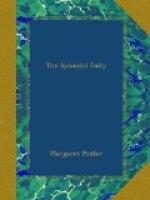CHAPTER XVI
BARONI’S OPINION OF MATRIMONY
“Per Dio! What is this you tell me? That you are to be married? . . . My dear Mees Quentin, please put all such thoughts of foolishness out of your mind. You are consecrated to art. The young man must find another bride.”
It was thus that Carlo Baroni received the news of Diana’s engagement—at first with unmitigated horror, then sweeping it aside as though it were a matter of no consequence whatever.
Diana laughed, dimpling with amusement at the maestro’s indignation. Now that she had given her faith, refusing to allow anything to stand between her and Max, she was so supremely happy that she felt she could afford to laugh at such relatively small obstacles as would be raised by her old singing-master.
“I’m afraid the ‘young man’ wouldn’t agree to that,” she returned gaily. “He would say you must find another pupil.”
Baroni surveyed her with anxiety.
“You are not serious?” he queried at last.
“Indeed I am. I’m actually engaged—now, at this moment—and we propose to get married before Christmas.”
“But it is impossible! Giusto Cielo! But impossible!” reiterated the old man. “Mees Quentin, you cannot haf understood. Perhaps, in my anxiety that you should strain every nerve to improve, I haf not praised you enough—and so you haf not understood. Leesten, then. You haf a voice than which there is not one so good in the whole of Europe. It is superb—marvellous—the voice of the century. With that voice you will haf the whole world at your feet; before long you will command almost fabulous fees, and more, far more than this, you can interpret the music of the great masters as they themselves would wish to hear it. Me, Baroni, I know it. And you would fling such possibilities, such a career, aside for mere matrimony! It is nonsense, I tell you, sheer nonsense!”
He paused for breath, and Diana laid her hand deprecatingly on his arm.
“Dear Maestro,” she said, “it’s good of you to tell me all this, and—and you mustn’t think for one moment that I ever forget all you’ve done for me. It’s you who’ve made my voice what it is. But there isn’t the least reason why I should give up singing because I’m going to be married. I don’t intend to, I assure you.”
“I haf no doubt you mean well. But I haf heard other young singers say the same thing, and then the husband—the so English husband!—he objects to his wife’s appearing in public, and presto! . . . Away goes the career! No singer should marry until she is well established in her profession. You are young. Marry in ten years’ time and you shall haf my blessing.”
“I shall want your blessing sooner than that,” laughed Diana. “But I’m not marrying a ‘so English husband’! He’s only partly English, and he’s quite willing for me to go on singing.”




